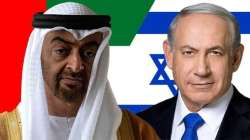Abraham Accord: The Real Deal of the Century!
Experts believe that Abraham Accord deal can change the geopolitics of West Asia like no other even in recent history and has its own shares of winners and losers.

Otto Von Bismarck had once said, "Politics is the art of the possible, the attainable – the art of the next best." This essentially means that anything is possible in the domain of politics. As they say, you do not have permanent friends or permanent enemies but only permanent interests in the field of politics. Everything else is secondary, it can therefore be argued. Nothing could justify this statement more than the "Abraham Accord", the recent peace agreement agreed by the Israel and UAE at the behest of USA, under the leadership of US President Donald Trump.
Experts believe that this deal can change the geopolitics of West Asia like no other even in recent history and has its own shares of winners and losers.
While Israel in general and Israeli Prime Minister Benjamin Netanyahu in particular are said to be the biggest gainers from this deal as it would greatly enhance their international legitimatcy and credibility, the Palestinians are among the biggest losers as they have lost a major influential player of Muslim world to Israel and their are strong chances that other countries too would follow the UAE way gradually.
Although not fully established, yet the entire world is looking at this deal with much eager and excitement and India is no exception to it. In fact, India is one of the few countries that is believed to benefit heavily by this deal as both Israel and UAE are very close partners of India and India has always wanted amicable relations between Israel as well as the Arabs states.
Our relations with the Arab world are historic, civilisational and of mutual benefit. A large number of Indians work in the Gulf region which provides the much needed jobs and remittances.
It had been a difficult task for Indian foreign policy establishment to create a fine balance between India's relations with Israel and with that of the Arab world as both Israel and Arabs did not see each other eye to eye. Due to the compulsions of domestic politics and the belief that having ties with Israel would antagonise the Muslim world, India maintained considerable distance with Israel.
With Oslo Accord between Israel and PLO (Palestine Liberation Organization) in the early 90s, India finally got the opportunity to establish diplomatic relations with Israel. Since then the ties have become stronger.
Under the leadership of Prime Minister Narendra Modi, Indian Foreign Policy has become pro-West Asia and interestingly all the major stakeholders in West Asia, which are mutually against each other, are in favor of maintaining good relations with India, be it the Jewish power Israel, the Sunni power Saudi Arabia or the Shia power Iran.
However, in the last six years we have come much closer to the GCC countries and Israel, both in terms of economy, people to people, culture etc. But our relations with Iran has been on a downwards spin due to our growing closeness with the US.
The personal chemistry between Prime Minister Modi and Israeli PM Benjamin Netanyahu and Abu Dhabi Crown Prince Mohammed Al Nahyan has already escalated the stakes of India in the region and this deal would make India gain benefits from both the states.
At a time when Iran is gravitating towards China and away from India, India needs strong allies in the region.
Already the neo-Islamism in Turkey under Turkish President Erdogan has raised serious alarms in New Delhi. Turkey’s coziness with Pakistan and its alleged support to anti-India non state actors has become the new headache for India. Therefore, in order to counter Pakistan over the Kashmir issue, it needs the support of Muslim countries, especially the Arabs who hold a considerable say in the Muslim affairs globally.
Crown Price of Saudi Arabia Mohammed Bin Salman and PM Modi hold very good personal ties, in any case. If the Abraham accord turns into a full-fledged deal, as is generally believed, then this would be the real 'deal of the century' and not the Trump Peace Plan for the settlement of conflict between Israel and Palestine, which President Trump called as one!
It would alter the geopolitical dynamics of West Asia in an unimaginable way as UAE is only the third Arab country to recognise the state of Israel. It is widely believed that this would also pave the way for other Arab and Muslim countries to establish diplomatic relations with Israel.
In any case, the Palestinians will have to live with the new realities of the world where they have no strong global power to hold their hand and champion their cause the way USSR and third world countries did some decades back.
At best, it should demand for more aid and global recognition. As Francis Fukuyama had predicted that post cold war world would become a world with an "end of the ideology", it is turning out to be true. No more sentiments of 'musilm brotherhood' can escalate the support for Palestinians.
At best, the solidarity for Palestinians among the Muslim countries remain ceremonial and far from real. It is only in some muslim countries like Pakistan and Turkey where this sentiment has some currency till date. Everywhere else, people are seeking personal and national benefits from their association with Israel.
(Ravi Ranjan is a media consultant, author and works closely with government agencies. Views expressed here are author's personal and not of India TV's)